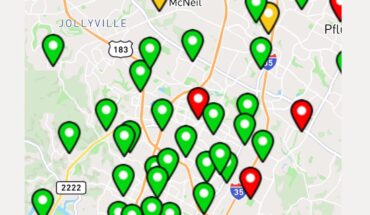He said that generally in such instances, “the importance of the argument in favor of secrecy has to rise to a certain level to justify the time and money to challenge one of those attorney general rulings.”
“The spirit of the law and the spirit of good government is to lean toward transparency,” said Thomas Leatherbury, a Dallas attorney and director of the First Amendment Clinic at Southern Methodist University. “This is the opposite of that. It is not transparent at all.”
Kocurek told the American-Statesman that she decided to approach commissioners after revelations of Garza’s security allotment.
“When I saw that they had granted the district attorney’s request, I thought it was only fair for us to make our request for all elected officials,” she said.
State lawmakers later passed the Judge Julie Kocurek Judicial and Courthouse Security Act that provided better protection of judge’s personal information online and required emergency protection plans, among other measures. This week, Kocurek is receiving the William H. Rehnquist Award for Judicial Excellence, one of the nation’s highest judicial honors, from the National Center for State Courts for her judicial security advocacy.
During her commissioner testimony, Kocurek reported that between 2018 and 2023, there have been 522 threats, 29 assaults and 68 bomb threats involving Texas judges. Threats have increased 125 percent from 2023 to 2024, she added.
Guerra Gamble, who heard the 2022 trial that resulted in a $45 million verdict against Jones in a case brought by parents of the Sandy Hook school shooting, said Travis County civil judges increasingly hear polarized cases.
“They are high profile, they are political, they are sometimes designed to cause a reaction in the public,” she said. “Every time I am in the paper, I get a barrage of communications from people telling me various things about how I am doing my job, and who I am, and threatening me.”
Guerra Gamble reported to commissioners that a litigant had joined a judge’s church to try to be closer to that judge, causing the church to develop a security response “and obviously making the judge very uncomfortable interfering with their life there.”
“All of us who do this work receive negative communications,” she added. “Many of us receive communications that are truly vile and really just unbelievable to receive … racist, sexist, ageist, sizeist – it is in there. And then there is the message that they think they want to take care of you and the threats.”
Kocurek concluded, “We are here today to ask that Travis County help our district and county judges and all elected officials and magistrates who also deal with these people, the litigants, secure their homes and persons. It would help protect us where we are most vulnerable so we can do our jobs free from danger.”
Although much of the discussion was in public, commissioners recessed into executive session to more specifically discuss threats against judges.
Kocurek said officials are still developing protocols about what services judges may receive through the $500,000 pool. It is also unclear how much information the county will release about that program and what the public could learn about government-funded enhancements to an official’s home.
Increasingly political battle emerges
The legal battle between Garza and Paxton is the latest political friction between the two.
Paxton targeted Garza and other urban progressive district attorneys this year with proposed new rules establishing reporting requirements for major city district attorney’s about case dismissals. The rules remain under development.
Garza drew particular condemnation from Paxton following the 2021 indictments of nearly two dozen police officers on excessive force-related charges from the 2020 social justice protests.
Paxton posted on X: “Texas’s Soros-funded leftist DA Jose Garza is attacking Austin Police for protecting us against the 2020 BLM riots. We should defend those who defend us. I support the cops that Garza wants to destroy.”
Garza has dismissed all but four cases.
Paxton also criticized Garza’s decision to prosecute Daniel Perry in the shooting death of a protester that Perry said was self-defense. A Travis County jury convicted Perry of murder, but Gov. Greg Abbott pardoned and released Perry from prison .
After Perry’s conviction, Paxton told Fox News: “Self-defense is a God-given right, not a crime. Unfortunately, the Soros-backed DA in Travis County cares more about the radical agenda of dangerous Antifa and BLM mobs than justice. This week has shown us how rogue prosecutors have weaponized the judicial system. They must be stopped!”
In arguing against the release of security information, Garza and county attorneys contend that such records would put him at risk and that he has a common-law right to safety.
Paxton’s office agreed in its Oct. 9 ruling that the release of some information would “subject the official to substantial risk of harm.” However, it says the county had not sufficiently argued other information must be withheld.
Paxton’s suit against the county for the alleged open meetings violation also cited intense public interest for what the suit described as a highly unusual expenditure to protect an official’s home.
More: 5 transparency experts say Texas AG Ken Paxton’s suit over DA Garza security has merit
Bill Aleshire, a former Travis County judge who now works as an attorney specializing in open government, said the public should try to separate politics from what he said is a legitimate public records battle.
“The attorney general has shown the (DA) some special attention, but that doesn’t mean he is wrong on the law,” he said. “Regardless of whether there is politics, he is right on the law.”






